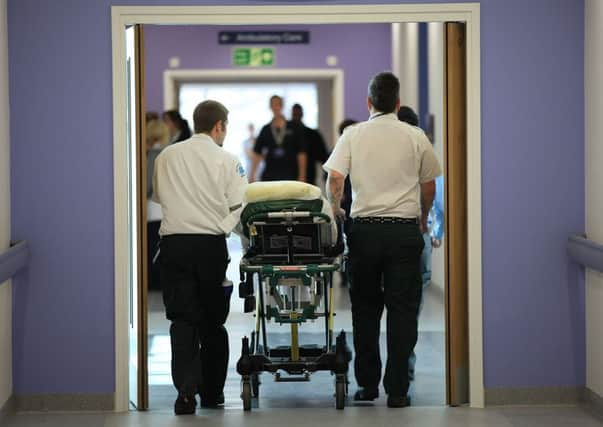Convicts to work on Western General hospital wards


Cleaners, catering staff and porters have been told about a planned prisoner work-placement scheme in the last few days – with many angry over a lack of consultation.
It is understood that the Western General Hospital will be used as a pilot site for the scheme, which aims to reduce reoffending.
Advertisement
Hide AdAdvertisement
Hide AdNo firm start dates have yet been decided as NHS Lothian and the Scottish Prison Service thrash out the finer details to ensure patient, staff and public safety.
If successful, the initiative, which will be open to offenders nearing the end of their sentence, could then be wheeled out across Scotland.
But staff have lodged concerns over who will be responsible for offenders on the wards, and how convicts will pass the stringent Criminal Record Bureau (CRB) checks faced by all hospital workers.
And patients groups fear members of the public would be left feeling anxious about convicted criminals being given “access to wards and their personal belongings”.
The Scottish Prison Service insisted that the type of prisoner put forward for placements “would depend on a rigorous risk assessment” being completed.
One hospital worker, who asked not to be named, revealed how staff were only told of the plans after supervisors were called to a meeting at Saughton Prison. He said: “It’s all been very hush-hush, which only adds to the concern. None of the staff want this. Who will be responsible if one of these guys robs someone or one of the drug stores?
“It seems like we’ll be asked to complete our normal duties whilst also making sure that the guy they’ve partnered us with doesn’t rob the place or attack someone.
“It all seems a bit hypocritical that NHS staff must undergo CRB checks when these guys will come straight out of prison and on to a ward and placement.”
Advertisement
Hide AdAdvertisement
Hide AdUnion leaders have, however, given their backing to the plans after receiving assurances that those selected will be “comprehensively vetted” and “low level” criminals. Mick McGahey of Unison said: “We understand our members’ concerns, but we have been assured that there will be strict regulations as to who can go on such placements with a robust monitoring plan put in place. We are supportive of the scheme as we feel it is only right to offer people the chance to redeem themselves.”
Though the scheme is a first for the NHS, several large employers, such as Timpson, Greggs and Boots, have in recent years shown willingness to employ convicts on a day-release basis. Timpson has since gone on to employ nearly 300 convicts over the last four years, with just seven reoffending.
Politicians also gave broad backing to the scheme – but said it was important that tough checks were carried out.
John Lamont, Scottish Conservative chief whip, said: “Staff are right to be concerned if the same checks that apply to everyone else are not applied to offenders. It is to be hoped that all necessary checks are carried out to ensure this scheme works.”
And Scottish Labour shadow health spokesman Neil Findlay said an “extensive consultation” process should take place with current employees.
But the Scotland Patients Association said the move would only add to patients’ anxiety as they went into hospital.
Executive director Dr Jean Turner said: “I’m sure that members of the general public would be very uncertain about this. For many, hospital is a place of confidentiality and privacy and a plan such as this will no doubt make patients feel very vulnerable and anxious.
“It is only right that people are rehabilitated but the success of this scheme will depend on its management and supervision.”
Advertisement
Hide AdAdvertisement
Hide AdUnder current rules, any NHS job which deals with frontline medical care requires a full enhanced CRB check.
However, for roles which are considered “positions of trust” and involve a degree of contact with children or vulnerable adults – such as a cleaner – the NHS is also entitled to see a person’s full criminal history.
Both the prison service and NHS Lothian confirmed talks had taken place about the work-placement scheme.
A Scottish Prison Service spokeswoman said: “We are in the process of discussing a range of potential placement opportunities with a number of employers, including NHS Lothian.
“Prior to commencement of any placement, we would undertake rigorous risk assessments both in terms of the work being undertaken and the individual on placement.”
Alan Boyter, NHS Lothian director of human resources and organisational development, said: “We are discussing a range of opportunities for offenders, who are about to be released from prison, being given a work placement within NHS Lothian.
“Public and patient safety will, of course, remain our top priority when considering suitable posts. We have also discussed at length with unions to gain their support. The project is designed to help tackle social deprivation, improve health and inter-agency working to try and break the cycle of reoffending.”
NHS Lothian employee director Alex Joyce added: “We are happy to support the project. If any staff have any reservations about the scheme, we would be happy to discuss it with them. It aims to increase rehabilitation and reduce reoffending.”